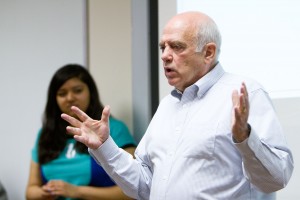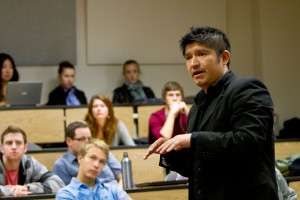Students gathered to learn about a club that will help in ending human suffering and listen to guest speaker Warner Woodworth at the first Microfinance Club meeting on Thursday.
BYU’s Microfinance Club earns money for organizations that give loans to small business owners in Third World countries who need help to get on their feet, as well as provides a network for students looking to intern for these organizations.

“Microfinance is a different way of looking at charity,” Dane Hammer, club president, said. “Instead of just giving money, it’s a way to make people self-sufficient. We give them a loan that they will have to pay back in the future. They become more efficient with their funds, and they become their own boss.”
Hammer said the club is just starting and there is still a lot of brainstorming to be done. But the club plans to work with the MicroBusiness Mentors in Provo, a microfinance organization that helps small business owners in Provo and Orem and raises awareness for the cause.
“Our goal and our mission is to provide students with a network who are interested in getting involved through internships,” Hammer said. “We want to create a hub for networking and raise awareness of what microfinance is. I see us doing more events like this — raising awareness and then fundraising.”
Warner Woodworth, a professor of microfinance, spoke at the meeting and urged students to have as much enthusiasm to end human suffering as they have had for football games.
“Our job as Latter-day Saints is to help people take care of themselves,” Woodworth said. “The LDS Church has given millions to microfinancing.”
Rachel Zwingli, a junior and psychology major, said she likes how the club works on an individual level.
“Professor Woodworth is always saying, ‘Rather than having a bird’s-eye view, we need to have a worm’s-eye view,'” Zwingli said. “A really big part is that it’s a hand up, not a hand out. People have to prove themselves first and work hard, and they do.”

Lamoni Limon, a senior minoring in nonprofit management and a member of the Microfinance Club, is a founder of a microfinance organization that helps youth in developing countries earn the money and resources to serve a mission while they gain valuable business skills.
“The main focus is to help the youth to receive enough money to pay for mission expenses,” Limon said. “Many youth in Mexico … can go at 18 … but they don’t have the money. We want people to get involved with this. So many people that were allowed to serve a mission want to know how to help.”
Youth can apply online to the program at jsbc.info. Once accepted, they can take online classes that give them the skills to create their own businesses. Youth can then apply for microcredit that will help put their business into action. The money earned will be used to pay back their loans, while the rest goes toward their missions.
“I have seen that there are some needs and the ways we try to fill those needs sometimes are not the right way,” Limon said. “I see in microfinance a more effective way to provide that help.”




